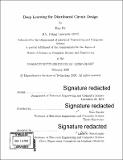Deep learning for distributed circuit design
Author(s)
He, Hao,S.M.Massachusetts Institute of Technology.
Download1203138685-MIT.pdf (6.524Mb)
Other Contributors
Massachusetts Institute of Technology. Department of Electrical Engineering and Computer Science.
Advisor
Dina Katabi.
Terms of use
Metadata
Show full item recordAbstract
In this thesis, we present deep learning models for designing distributed circuits. Today, designing distributed circuits is a slow process that can take months from an expert engineer. Our model both automates and speeds up the process. The model learns to simulate the electromagnetic (EM) properties of distributed circuits. Hence, it can be used to replace traditional EM simulators, which typically take tens of minutes for each design iteration. Further, by leveraging neural networks' differentiability, we can use our model to solve the inverse problem - i.e., given desirable EM specifications, we propagate the gradient to optimize the circuit parameters and topology to satisfy the specifications. We propose two models, Circuit-Net and Circuit-GNN. Circuit-Net is a complex-valued residual network that, once trained, can accurately generate simulation results for a specific type of circuit. Circuit-GNN is an extension of Circuit-Net, which exploits the flexibility of Graph Neural Network (GNN) to handle circuits with different topologies. We compare our model with a commercial simulator showing that it reduces simulation time by four orders of magnitude. We also demonstrate the value of our model by using it to design a Terahertz channelizer, a difficult task that requires a specialized expert. The results show that our model produces a channelizer whose performance is as good as a manually optimized design and can save the expert several weeks of topology and parameter optimization. Most interestingly, Circuit-GNN can come up with new designs that differ from the limited templates commonly used by engineers in the field, hence significantly expanding the design space.
Description
This electronic version was submitted by the student author. The certified thesis is available in the Institute Archives and Special Collections. Thesis: S.M., Massachusetts Institute of Technology, Department of Electrical Engineering and Computer Science, February, 2020 Cataloged from student-submitted PDF version of thesis. Includes bibliographical references (pages 53-55).
Date issued
2020Department
Massachusetts Institute of Technology. Department of Electrical Engineering and Computer SciencePublisher
Massachusetts Institute of Technology
Keywords
Electrical Engineering and Computer Science.